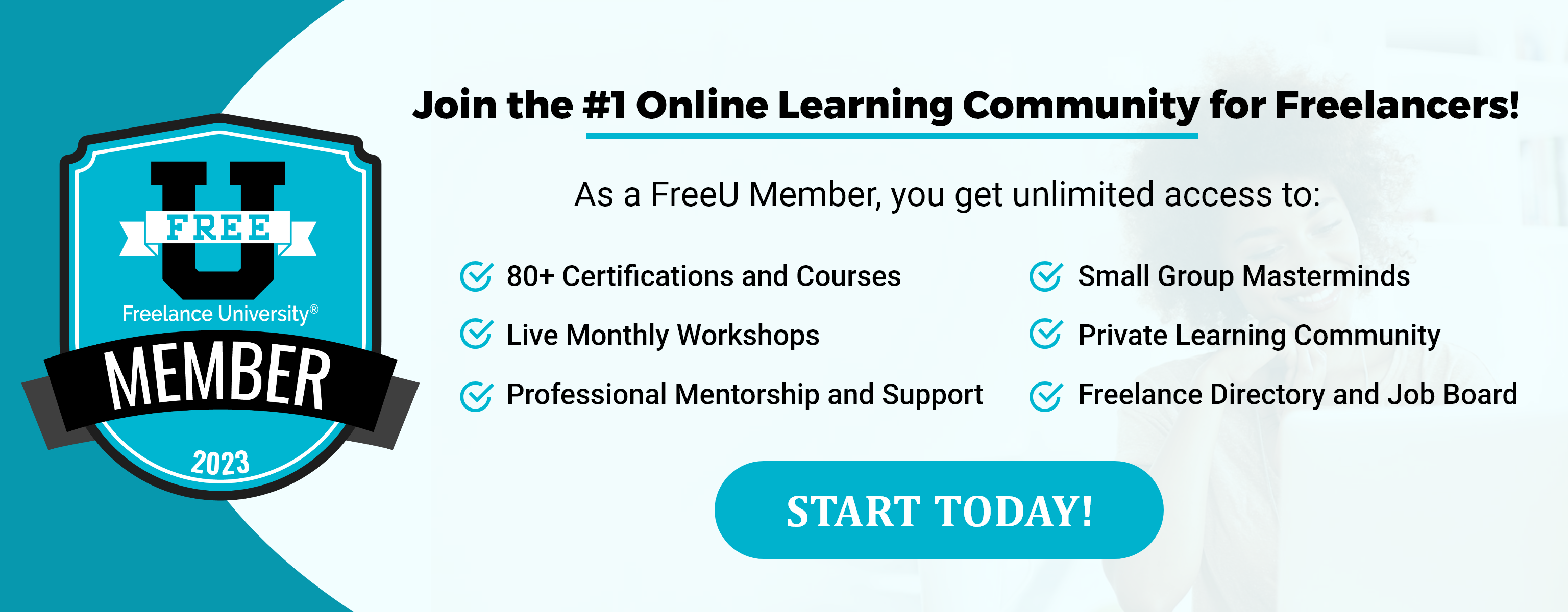How to Discover Your Ideal Freelance Niche
By Craig Cannings

Many of us have heard the quote “the riches are in the niches” as motivation to niche down our freelance or virtual assistant business. And that alone is keen motivation for finding your niche.
When you heard the quote, however, did you think of riches in financial terms? That’s often the first image that comes to mind. But niches also bring us other kinds of riches that provide long-term benefits for our businesses.
In this article, we’ll outline some practical steps for evaluating yourself and the market to determine the best type of niche to pursue. But before we do that, let’s back up and define what a niche is.
What is a Niche?
In our course, “The Fine Art of Niching Down,” Freelance University co-founder and instructor Craig Cannings defines a niche as “a specialized service and/or market that is suited to your personality, passions, proficiencies, and professional background.”
Those four elements are part of the “Niche Identification Matrix,” which we’ll explore in more detail below. They show that finding your niche involves looking deep inside yourself and evaluating your experiences.
Brad Hussey, in an article titled “How to Start a Freelance Business in 2021 – Complete Guide,” says, “The overlap between what you are good at doing, a problem for a specific group of people, and the solutions you can provide to them is called your niche.” This definition shows that an outward focus is also part of a niche. In essence, you need to consider your past, present, and future as it relates to yourself and your target audience.
The Benefits of Having a Niche
What if you’re just starting out and don’t know what to specialize in? Can you do more general tasks that serve a broader client base? The answer is yes. It’s okay to try a variety of tasks to see what you enjoy doing. But in the long term, finding your niche will have a more positive effect on your business and client relationships. And on your own well-being.
Consider this tale of two freelancers:
Freelancer #1
• Willing to perform a variety of tasks, anything from bookkeeping to graphic design to social media management
• Has a large target audience spread out over several freelance niches
Freelancer #2
• Performs a specialized set of tasks involving social media management for restaurant owners and brick and mortar businesses
• Has a target audience focused on particular industries and served by a specific freelance niche
The benefits of having a niche are evident when you start to explore the process of running your business and marketing it. At first, offering a wide variety of services can help build your client base. But over time, you may start to feel stretched in too many directions. When you want to hone your skills by seeking additional training, you have double or triple the number of courses you’re taking.
You might realize you enjoy some tasks more than others. But you can’t devote as much time to them as you’d like because you’re busy with other types of tasks. Your business might become weighted towards your least favorite tasks if they’re more in demand. And the more you do work you don’t enjoy, the more your enthusiasm and energy will wane.
In an article titled “How to find your niche as a Freelancer,” Viktor Marinov asserts, “Finding your niche can result in more projects and work, boost your income, and ultimately make you happier with what you do.” He believes that it’s “often the best way to take your business to the next level.”
And instead of limiting how many clients you have, it provides more targeted opportunities. The VA Handbook article “How to work out your Virtual Assistant niche” lists reasons why having a niche or niches is beneficial. For instance, “you will always be able to explain what you do and how you can help,” and “marketing becomes easy because you know exactly what type of client you are looking for.”
Finding Your Niche
How do you identify the best niche for your business? Let’s go through some practical steps. First, we’ll return to the Niche Identification Matrix from “The Fine Art of Niching Down” course.
Consider the four elements — Personality, Passions, Proficiencies, and Profitable Niches — and ask yourself the following questions:
1. Personality
• What are the personality traits and qualities that make me unique?
2. Passions
• What tasks or areas interest me?
3. Proficiencies
• What are my unique skills and background experience?
4. Profitable Niches
• What niches present the best client and income opportunities?
Spend some time reflecting on these elements and use a paper notebook, online note-taking or mind-mapping tool to record your thoughts. Don’t rush. When going through the first three elements, describe how you really are, not how you think you should be.
Viktor Marinov has some additional great advice in his article, where he puts the concept of finding your niche into perspective:
“Talk to people who focus on different things and think about what drives them. Does it sound like something that you could be into? Try it out. Think of it like this – you have five different kinds of candy. You can either keep eating without switching out of convenience or alternatively try all five and find out what you like most.”
And the VA Handbook article above suggests that you could unexpectedly discover your ideal niche. For example, if your client introduces you to a task you end up enjoying, you might ultimately become proficient enough to offer it as a service.
How to Explore Profitable Niches
The fourth element, “Profitable Niches,” deserves some focused attention. When you want to discover which niches present the best client and income opportunities, Craig Cannings recommends researching the following questions:
1. What do the stats say?
For example, search on statistics portals like Statista, and read specific articles that talk about your chosen niche to see how many businesses are using a particular service. That way, you can see how much demand there is and whether you’ll be filling a gap for clients.
2. What do my clients and colleagues say?
Speak to your clients and colleagues individually, observing what types of services are being requested. And participate in online groups focused on your peers or on particular industries. For instance, if you belong to Facebook or LinkedIn groups, you can discover information from discussions or from questions you post yourself. This will help you find out what services are being offered and what’s hot.
3. What does Google say?
Use tools like Google Trends or Ubersuggest to see how many people are searching for words related to your niche or service area.
4. What do the marketplaces say?
Search on sites like Upwork, FreeUp, and PeoplePerHour to see where the demand is for certain services and niches. By observing the most popular categories, projects, and top skills, you can determine whether your chosen niche will be profitable and in-demand!
Final Thoughts
When you go through the process of finding your niche, remember that it doesn’t have to be set in stone. No matter how long you’ve been offering a particular service, you can still be flexible. As Craig Cannings says, “You can always change, adapt or broaden your niche service as time goes on.” So, it’s worth saving the four questions from the Niche Identification Matrix and returning to them periodically. As your skills and experience grow, so too can your niche.
And consider this powerful quote from Connor Gillivan in a previous FreeU blog post, “How to Select a Niche Focus for Your Freelance Business.” He says,
“Focus and mastery is the fuel formula that will blast your freelance business to the heights of success.
“And that means targeting a single freelance niche. It’s the better alternative because it allows you to focus on what you’re really good at. You will use your natural talents and abilities and become intrinsically motivated so that you can use your energy to grow instead of simply surviving week to week.”
Now we’d love to hear from you! What steps will you take to find your ideal niche? And if you’ve already found it, how has niching down benefited your business? Please share your thoughts in the comments below.











































































































